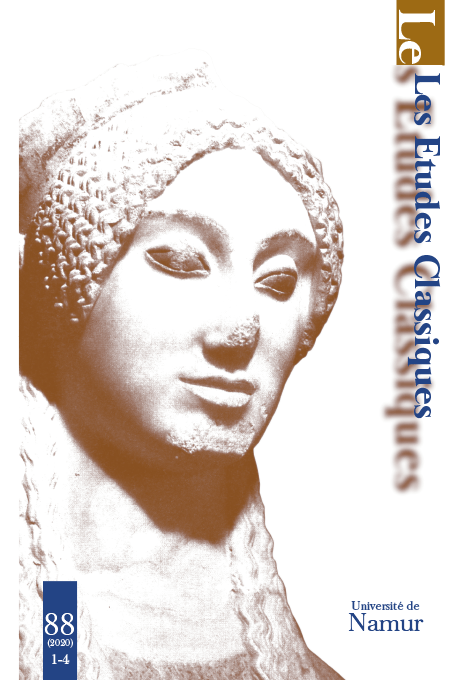 previous article in this issue previous article in this issue | next article in this issue  |

Preview first page |
Document Details : Title: The Vernacular through the Greek Lens Subtitle: John Palsgrave's French Grammar (1530) and his Model Theodore Gaza Revisited Author(s): VAN ROOY, Raf Journal: Les Études Classiques Volume: 88 Issue: 1-4 Date: 2020 Pages: 405-429 DOI: 10.2143/LEC.88.1.3290455 Abstract : This contribution challenges the idea that the English humanist John Palsgrave, in his pioneering French grammar of 1530 (Lesclarcissement de la langue francoyse), was barely influenced by the work of the Byzantine scholar Theodore Gaza. I argue that Palsgrave was in an excellent position to be intimately familiar with Gaza’s grammar through his studies in England, Paris, and Leuven, and that this familiarity is indeed reflected in his Lesclarcissement. Palsgrave’s acquaintance with Greek grammar is particularly obvious in his discussion of aspects of French pronunciation, orthography, parts of speech, and regional variation. His analysis of the article and the simple past in French is especially remarkable, since he offers an accurate and well-founded interpretation of both phenomena while using Greek grammatical concepts. La présente étude conteste l’idée que Jean Palsgrave, humaniste anglais et auteur de la première grammaire française (Lesclarcissement de la langue francoyse, 1530), ne fut guère inspiré par l’œuvre du savant byzantin Théodore Gaza. Nous tentons de démontrer que J. Palsgrave était très bien placé pour avoir une connaissance approfondie de la grammaire de Gaza grâce à ses études en Angleterre, à Paris et à Louvain, et que cette connaissance se reflète effectivement dans son Lesclarcissement. Cette familiarité se remarque dans son traitement de certains aspects de la langue française, principalement la prononciation, l’orthographe, les parties du discours et la variation régionale. L’analyse que propose J. Palsgrave de l’article et du passé simple français est particulièrement notable, puisqu’il offre une interprétation minutieuse et bien étayée des deux phénomènes, en s’appuyant sur des notions grammaticales d’origine grecque. |
 |


